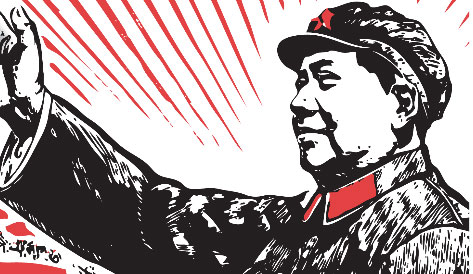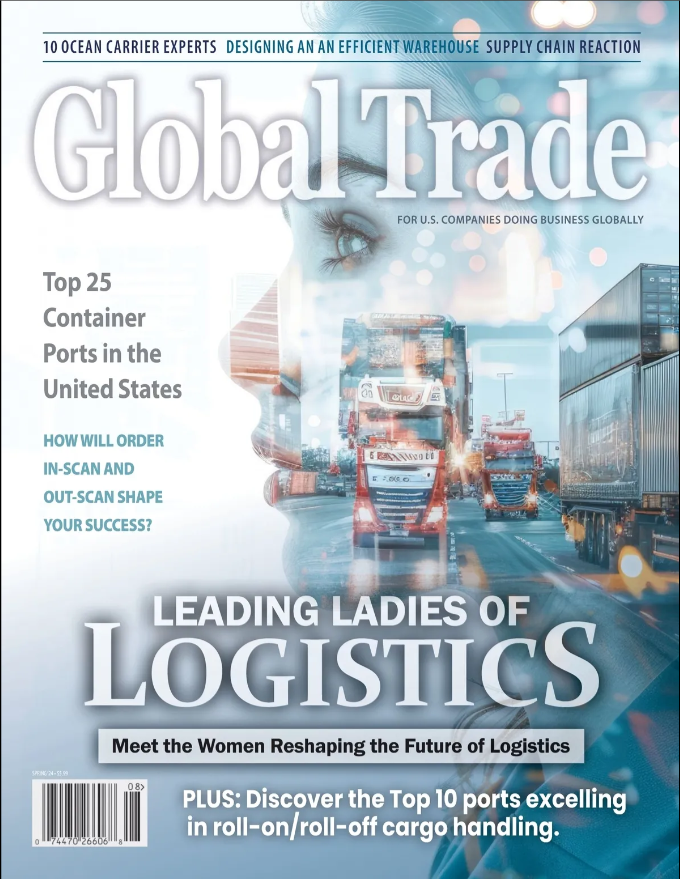FINE CHINA

IN THE RED
Should the U.S. adopt Chinese business practices?
Americans love China. Americans hate China. We asked two experts to explore the troubled relationship between the world’s biggest trading partners.
Can we learn something from the Chinese about manufacturing? We asked Global Trade contributor Greg Autry to speak with New York University professor Ann Lee, author of What the U.S. Can Learn from China: An Open-Minded Guide to Treating Our Greatest Competitor as Our Greatest Teacher.
A former investment banker and hedge-fund partner, Lee has an informed (albeit cynical) view of Wall Street, and she’s been an adjunct professor of economics and finance at New York University. Her China insights are also very personal. As a former visiting professor at Peking University, she’s spent a great deal of time on the ground there. But it’s more personal than that: her family fled the Communist state. In What the U.S. Can Learn from China, she notes her father will always be “biased against China’s leadership no matter what evidence I cite because the Chinese Communist Party ruined his family, stole their wealth, and condemned them to a life of hardship and misery.”
For his part, Autry is a lecturer at the University of California Irvine’s Paul Merage School of Business. He’s also (with his colleague Peter Navarro) an author himself—of Death by China: Confronting the Dragon, a book you can safely judge by its cover.
Their conversation took place by phone and email in late January. We have edited it for clarity and length.
Autry: What would you tell an American who’s lost his job at the factory and had to take two retail jobs without benefits selling Chinese-made goods to his fellow Americans about why the U.S.-China relationship has been mutually beneficial?
Lee: I would say that his job loss is the result of U.S. policies. We have a tax policy that doesn’t tax corporations for overseas profits so there’s no incentive for them to invest in America. Meanwhile individuals like that factory worker get taxed on earned income. So there’s significant bias in our tax code. The fact that there is no retraining—that people on unemployment can’t to go back to school to get retrained if they want to continue receiving unemployment checks—is another flaw. We have three million jobs in the U.S. that go unfilled for six months or longer, and most of these are in technical fields, including manufacturing; we should be retraining people to work on high-tech manufacturing. Simply to blame the Chinese is not being cognizant of all the things the U.S. government can really do to help that factory worker get back on his feet.
But I also really don’t think they [U.S. workers] want to take on these cheap, labor-intensive jobs that some companies have outsourced to China. They [U.S. manufacturers in China] pay the Chinese nothing, and I don’t know anyone here in the United States who would work for $5 a day. Even if the job left China, it wouldn’t come back here for them. It would either be replaced by machines or go to another country with cheap labor.


AUTRY
Is Western progress undermined when companies can simply circumvent U.S. law by manufacturing in China?
LEE
If companies want the benefits of U.S. incorporation, then U.S. policymakers can dictate the rules they follow.
Autry: I see large, nominally American, multinational corporations as exploiting Chinese workers—with the sanction of the Chinese Communist Party—by running over to Shenzhen to take advantage of subsidies and a lack of regulatory enforcement which produces labor abuse, environmental destruction, and quality shortcuts that increase corporate profits.
Lee: Environmental issues and labor abuses have been a problem for every single country that went through industrialization. Charles Dickens documented child labor abuses in England, and the U.S. has had its share of labor and environmental abuses. The Cuyahoga River [in Cleveland, Ohio] caught fire because of excessive pollution in the U.S. as recently as 1969. While it took centuries for Western countries to correct these issues, Chinese leaders recognize them and are making changes so that hopefully they will be corrected within the next couple of decades.
While I don’t condone Chinese labor abuses in any way, I believe the U.S. government shares the blame on this one. The U.S. government encourages outsourcing through its free trade and tax policies. If corporations abuse labor in the states, we all condemn them. But when corporations such as Apple exploit people in other countries by hiring intermediaries such as Foxconn, we worship Steve Jobs as a hero. Stockholders love the high profit margins, and consumers love the low prices. In the meantime, we blame China for our loss of jobs. There is inherent hypocrisy in this line of argument.
Autry: I think our readers are likely to acknowledge that industrialization is—or at least has been—an inherently messy (sometimes even ugly, violent, racist) process, but also that the West has done a lot (and continues to do much) to restrain its worst excesses. But is such progress undermined if manufacturers can simply circumvent U.S. law by manufacturing in China?
Lee: How U.S. corporations behave is completely within the control of U.S. regulators. If corporations want the benefits associated with being a U.S. corporation, then U.S. policymakers can dictate the rules they must follow—including whether to outsource to China. The problem with blaming China is that the U.S. never accepts responsibility for its own actions. Before China, Americans blamed Japan. I’m sure once China is out of the picture, there will be someone else to scapegoat. Rather than make it a national pastime to blame someone for the nation’s ills, U.S. citizens must recognize we can always define our own future. Whether we have the political will to do the right thing is entirely up to us.
Autry: In your book you suggest that China’s economic and geopolitical rise is the outcome of some positive political and cultural traits that might offer a model for America. What are these traits?
Lee: When the communists in China took over—back when Mao was in power—they really wanted to have a strong China. But they didn’t have the right policies and the right people in place. That led to the starvation of millions of Chinese. It was a complete disaster. Everyone knows what went wrong now. But I think something went right: the Chinese continued to try, continued to keep an open mind about what would work and what wouldn’t work. Instead of being completely married to an ideology, they started to pay attention to practical solutions. They tried to incorporate those practical solutions into their ideals, and that was what I think led to the rise of modern China.
Autry: So, one of the positive traits is ideological flexibility. In your book, you praise China’s current leadership for its willingness to adopt some features of market capitalism. But isn’t there always the possibility that because China is still authoritarian that it will produce another Mao and another disastrous Cultural Revolution?
Lee: There are risks in any system. In my book I say that systems have to match the time and the situation. In my chapter on meritocracy, I give examples of other countries that started out with benevolent authoritarians because they needed to make dramatic changes. Sometimes, having that sort of system is the most effective way to a peaceful transition to an industrial society; once that transition occurs, a more democratic system can replace it. I am not suggesting that [China’s] authoritarian practices get exported. In fact, I’m talking about specific principals—trying to give everyone a fair shake in terms of having power. And that is actually more democratic—so that people don’t rely on money to get power, but on their merits.
Autry: Let’s talk about the challenges for Americans of really getting a handle on the Chinese market. Take the country’s own estimates of its industrial output: A Wikileaks cable quoted Vice Premier Le Keqiang saying, “China’s GDP numbers are manmade artifacts,” and that even he doesn’t trust them. Do you trust what the Chinese government tells us? Or do you have to take all that with a grain of salt?
Lee: I do take their numbers with a grain of salt. But I think they’re sometimes under-reported as opposed to over-reported. For instance, I think the consumption numbers are much higher because many Chinese people still use cash and/or use the barter system so those transactions are difficult to capture in official statistics. They also tend to spend a lot of money outside their borders so that those numbers are not captured in China’s GDP consumption numbers but are instead captured in those of another country. When they go to America or Europe as tourists for instance, they make lots of purchases because in the Chinese culture you buy gifts for your colleagues and your bosses which tend to be luxury items that are very expensive. All those numbers don’t get reported in China’s GDP consumption numbers but are instead in America’s and Europe’s consumption numbers. That is why I think a lot of numbers go missing.
Autry: You suggest that the U.S. must be careful not to create a military adversary out of China. This strikes me as peculiar since the U.S. has been historically the friendliest of Western nations to China—not with a perfect record, but I think of the Boxer Rebellion scholarships of 1909, U.S. sanctions on Japan following the Rape of Nanking, and the volunteer Flying Tigers defending China against the Japanese. Indeed, America’s entry into World War II was obviously very beneficial to China. And yet, since Mao’s postwar rise, China has used America as an external boogie man to create unity within China. As an American, I find that unfair and offensive. Do really think it’s America that is creating the tension here?
Lee: Yeah, I think it is. We’ve had a history of prejudice against Chinese in America. If you go and look at history, it’s well-documented—starting with the folks that worked on the railroads and so forth; they weren’t even allowed to have children. This prejudice is long-lasting in the U.S. I agree that the U.S. has been friendly in helping China open during Mao’s last years, but that was mostly because the U.S. was trying to use China as a counterpoint to the Soviet Union.
And I think China hasn’t really done anything to threaten the U.S. in any way other than economic growth. Most Chinese admire the U.S. and would like China to be friends with the U.S. On the other hand, I think China’s economic growth and the relative decline of the U.S. have alarmed many citizens in the U.S. who don’t fully comprehend the reasons for the rapid changes. A lot of U.S. politicians who won’t take responsibility for their own policy mistakes would conveniently scapegoat China and say all the jobs are gone because of China. They use name-calling and other demagoguery by accusing China a “currency manipulator.” Even though we started out as friendly partners, and the early U.S. presidents—Nixon, Carter, Reagan—all had very strong relationships with Chinese leaders, of late the rhetoric has been much more hostile. A Cold War mentality has returned to both nations—a very unfortunate development.
China has not had any military designs on the U.S. and never would because that wouldn’t make any sense. Obviously, the U.S. being the strongest military power has no reason to fear China’s military. I think the tough rhetoric and the announcement by President Obama to redirect and redeploy Marines to Australia is sending probably the wrong message. That’s not going to help relations, either.
AUTRY: You say the Chinese admire Americans, but the leadership itself seems mistrustful of democracy.
LEE: Yes, I agree that some people in China dislike democracy, especially those government officials who enjoy absolute power. However, my prediction is that this will change within the next decade. China is already debating how and when to change their system of one-party rule. Many more open-minded high level officials recognize the system needs change, and I am hopeful that the change will come. I also believe that the Chinese people and government will be friendlier with the U.S.—that is, unless we continue to bash and threaten China.
AUTRY: What do you hope people take away from your book?
LEE: Basically my message is that people need to keep an open mind. I’m not endorsing all things China at all. I’m only suggesting that there are certain principals that can help the United States stay strong and productive. Every country has its strengths and weakness. We know what China’s weaknesses are and they’ve been articulated by folks like yourself and others. What we all need to consider is “What are the some of the best practices? What are things to that do work? How can we adopt them here and make our nation stronger?” I think that would be the more positive takeaway.


